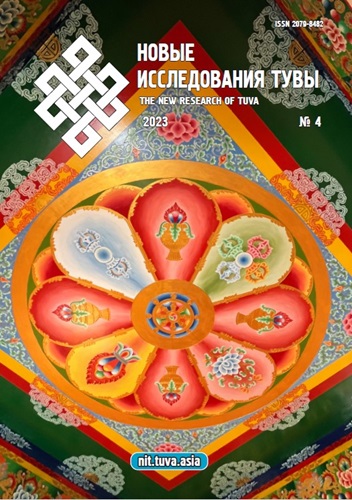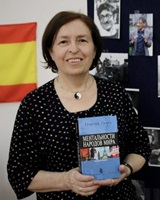Cosmo-psycho-logos of Tuva in the language of heroic epics
DOI:
https://doi.org/10.25178/nit.2023.4.7Keywords:
review; Tuvan heroic epos; Tuvan language; digital research; comparative studies; anthroponym; toponymAbstract
The article presents and analyzes the content of the monograph “Features of the Language of Tuvan Heroic Epics (In the Comparative Aspect)” by Mengi V. Ondar, published in 2022 in Abakan. The relevance of the work is determined by addressing the problem of revitalization of the archetypal lexical and semantic layers of minority languages geographically related to the Siberian area of the Russian Federation. The method of comparative analysis of epic texts using modern digital technologies (AntConc program) was highly appraised. The monograph is an innovative and productive research work. It is characterized by its compositional harmony, original research conception, strict academic style of presentation of the materials and the author’s awareness in the categories of related sciences (history, geography, ethnology, cultural studies). The retrospective part of the work covers a whole range of issues related to the history of the collection of materials and publications, the introduction of Tuvan heroic tales into scholarly discourse, as well as the unification of folklore terminology. The thesis about the fruitfulness of comparative studies has been proven and supported by the practice of multilevel analysis of Tuvan and South-Siberian Turkic heroic epics in order to determine ethnolinguistic and cultural similarities and differences. The high-frequency anthroponymic, toponymic and military lexical units identified with the help of the concordance program are carefully interpreted and used in arguments about the existence of similar models of linguistic categorization of the world that historically developed among the Tuvans, Altaians, Shors, Khakas and Mongols. A similar working algorithm was used for the objectification of such structural units as ‘cliché-space’, ‘cliché-time’, ‘cliché — iconic characteristic’, ‘beginning’, ‘ending’. It was supported by vivid illustrative examples from the corresponding epic texts. The monograph contains a series of tables that clearly reflect the results of the author’s comparative studies. In terms of its content, the work of Mengi V. Ondar is close to the philosophical conception proposed by Georgi D. Gachev about the “Cosmo-Psycho-Logos” and stimulates further research in this direction taking into account the folklore and language systems of other peoples of Russia and the world.
References
Arzamazov, A. A. (2022) Mariisko-udmurtskie poeticheskie paralleli i kontrasty. Opyt komparativnogo prochteniia [Mari and Udmurt poetic parallels and contrasts. An experience of comparative reading]. Kazan, Publishing House of the Academy of Sciences of the Republic of Tatarstan. 316 p. (In Russ.).
Bakhtikireeva, U. M. (2020) Izuchenie i opisanie natsional'nykh obrazov korennykh narodov RF posredstvom nositeleĭ iazyka, fol'klora i literatury — osoznannaia neobkhodimost' [Studying and describing national images of the indigenous peoples of the Russian Federation through the eyes of native speakers of language, folklore and literature: A conscious need]. In: Sokhranenie i razvitie iazykov i kul'tur korennykh narodov Sibiri [Preserving and developing languages and cultures of the indigenous peoples of Siberia] : Proceedings of the 4th All-Russian research-to-practice conference (Abakan, October 1–2, 2020) / ed. by T. G. Borgoiakova. Abakan, Katanov State University of Khakassia Publ. 230 p. Pp. 14–22. (In Russ.).
Burykin, A. A. (2020) Buddiiskie motivy v fol'klore (na materiale kalmytskikh, tuvinskikh i buriatskikh epicheskikh proizvedenii i bogatyrskikh skazok) [Buddhist motifs in folklore: The case of Kalmyk, Tuvan and Buryat epics and heroic tales]. New Research of Tuva, no. 3, pp. 189–209. (In Russ.). DOI: https://doi.org/10.25178/nit.2020.3.14
Vasilieva, O. V. (2019) Olonkho i kul'turnaia pamiat' sakha v didzhitalizirovannoi srede [Olonkho and the cultural memory of Sakha in a digitalized environment]. Tomsk State University Journal of Cultural Studies and Art History, no. 34, pp. 171–182. (In Russ.). DOI: https://doi.org/10.17223/22220836/34/17
Gachev, G. D. (1989) Neminuemoe. Uskorennoe razvitie literatury [Inevitable. Accelerated development of literature]. Moscow, Khudozhestvennaia literatura. 431 p. (In Russ.).
Gachev, G. D. (2008) Mental'nosti narodov mira [Mentalities of the peoples of the world]. Moscow, Eksmo ; Algoritm. 544 p. (In Russ.).
Gorelik, M. V. (2003) Oruzhie drevnego Vostoka (IV tysiacheletie — IV v. do n. e.) [Weapons of the Ancient East (4th millennium — 4th century BC)]. 2nd ed., enlarged. St. Petersburg, Atlant. 320 p. (In Russ.).
Grebnev, L. V. (1960) Tuvinskii geroicheskii epos: opyt istoriko-etnograficheskogo analiza [Tuvan heroic epos: An experience of historical and ethnographic analysis]. Moscow, Vostochnaia literatura. 145 p. (In Russ.).
Kyrgys, Z. K. (1997) O tuvinskikh epicheskikh napevakh [About Tuvan epic tunes]. In: Tuvinskie geroicheskie skazaniia [Tuvan heroic epics] / comp. by S. M. Orus-ool. Novosibirsk, Nauka. 584 p. Pp. 39–52. (Folklore monuments of the peoples of Siberia and the Far East, vol. 12). (In Russ.).
Lamazhaa, Ch. K. and Suvandii, N. D. (2019) Proekt uriankhaisko-tuvinskoi entsiklopedii [A project of Uriankhai-Tuva encyclopedia]. New Research of Tuva, no. 2, pp. 218–224. (In Russ.). DOI: https://doi.org/10.25178/nit.2019.2.19
Ondar, M. V. (2022) Osobennosti iazyka tuvinskikh geroicheskikh skazanii (v sopostavitel'nom aspekte) [Features of the language of Tuvan heroic epics (in the comparative aspect)]. Abakan, Zhurnalist. 320 p. (In Russ.).
Orus-ool, S. M. (2001) Tuvinskie geroicheskie skazaniia (Tekstologiia, poetika, stil') [Tuvan heroic legends (Textual criticism, poetics and style)]. Moscow, MAKS Press. 422 p. (In Russ.).
Sultanov, K. K. (2007) Ot Doma k Miru: etnonatsional'naia identichnost' v literature i mezhkul'turnyi dialog [From Home to the World: Ethnonational identity in literature and intercultural dialogue]. Moscow, Nauka. 302 p. (In Russ.).
Tatarintsev, B. I. (1976) Mongol'skoe iazykovoe vliianie na tuvinskuiu leksiku [Mongolian language influence on the Tuvan lexicon]. Kyzyl, Tuvan Book Publishing House. 130 p. (In Russ.).
Temirbolatova, A. I. (2012) Problemy iazykovoi politiki i iazykovogo stroitel'stva na Severnom Kavkaze (na materiale rukopisei arkhivnogo fonda R-1260 GASK — «Severo-Kavkazskii gorskii istoriko-lingvisticheskii nauchno-issledovatel'skii institut imeni S. M. Kirova» (1926–1937)) [Problems of language policy and language construction in the North Caucasus (based on the manuscripts of the archival fonds R-1260 of the State Archives of the Stavropol Krai — “S. M. Kirov North Caucasian Mountain Historical and Linguistic Research Institute” (1926–1937))] / ed. by K. E. Shtain and D. I. Petrenko. Stavropol, Stavropol State University. 314 p. (In Russ.).
Toynbee, A. J. (2002) Postizhenie istorii [A study of history] : Selected works / transl. from English by E. D. Zharkov. Moscow, AIRIS-press. 640 p. (In Russ.).
Tuvintsy. Rodnye liudi [Tuvans. Native people] (2022) / Ch. K. Lamazhaa, N. D. Suvandii, Sh. Yu. Kuzhuget and Sh. B. Mainy ; ed. by Ch. K. Lamazhaa and N. D. Suvandii. St. Petersburg, Nestor-Istoriia. 360 p. (In Russ.).
Published
How to Cite
For citation:
Kuchukova Z. A. and Berberova L. B. Kosmo-psikho-logos Tuvy v iazyke geroicheskikh skazanii [Cosmo-psycho-logos of Tuva in the language of heroic epics]. New Research of Tuva, 2023, no. 4, pp. 99-108. DOI: https://doi.org/10.25178/nit.2023.4.7
Issue
Section

This work is licensed under a Creative Commons Attribution-NonCommercial 4.0 International License.

Author(s) license holder(s) grant rights for their work to the journal (grantee of a license) under the simple non-exclusive open license in accordance with Art. 1286.1 «Open license for a research work, work of literature or fine arts», Civil Code of the Russian Federation.
New Research of Tuva publishes articles under the Creative Commons Attribution-NonCommercial license (CC BY-NC).
Since it is an open license, author(s) reserve the right to upload the article to their institutional repository, submit it to another journal (if it allows republications), or republish it on their own website (in full, or in part).
However, several conditions apply here:
a) The republished version must always contain the name(s) and affiliation(s) of the author(s), the original title and the hyperlink to the original version on the New Research of Tuva website;
b) It must be in open access, free of charge, and no category of readers must be in any way whatsoever advantaged over general readership.
c) should the contribution be submitted elsewhere by its author(s) without substantial modification (30% or more of original text unchanged), the body of the article should contain a disclaimer that the original version was published in New Research of Tuva (with a link to the respective page)
The CC-BY-NC is a non-revocable license which applies worldwide and lasts for the duration of the work’s copyright.










